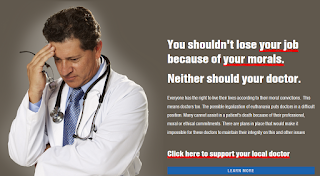International Chair - Euthanasia Prevention Coalition
 |
| New Mexico Supreme Court |
Catherine G. Foster, an attorney with the Alliance Defending Freedom who represented legislators urging the court to uphold the Court of Appeals and find no right to aid in dying, told Scott Sandlin from the Albuquerque Journal that the Supreme Court decision is “a win for all New Mexicans.
“Physician-assisted suicide threatens all people and turns the focus from treatment to terminality and death,” said Foster, executive director of Euthanasia Prevention Coalition USA. “Simply put, diagnoses and prognoses aren’t foolproof, and no law can protect our weakest citizens, particularly the elder and disabled communities, from the coercion and abuse that go hand-in-hand with (it).”
the State has legitimate interests in (1) protecting the integrity and ethics of the medical profession; (2) protecting vulnerable groups—including the poor, the elderly, and disabled persons—from the risk of subtle coercion and undue influence in end-of-life situations, including pressures associated with the substantial financial burden of end-of-life health care costs; and (3) protecting against voluntary or involuntary euthanasia because if physician aid in dying is a constitutional right, it must be made available to everyone, even when a duly appointed surrogate makes the decision, and even when the patient is unable to self-administer the life-ending medication. Therefore, we decline to hold that there is an absolute and fundamental constitutional right to a physician’s aid in dying and conclude that Section 30-2-4 is not unconstitutional on its face or as applied to Petitioners in this case.The original case was based on a word game. The original case argued that "aid in dying", which is also known as assisted suicide, is not prohibited by the New Mexico assisted suicide law because "aid in dying" is not assisted suicide.
The New Mexico Supreme Court decision found that "aid in dying" is assisted suicide and therefore it is prohibited by the State assisted suicide law. The decision states (page 14) that according to plain language:
For aid in dying, the lethal dose prescribed by a physician is intended to provide the means for a patient to end his or her own life, which is consistent with how “aiding” has been defined under Section 30-2-4. Therefore, when providing aid in dying, a doctor prescribes a lethal dose of barbiturates for the patient’s use as a means to end his or her own life—conduct clearly encompassed by the plain language of Section 30-2-4.The original case also argued, that if "aid in dying" is assisted suicide, then the New Mexico assisted suicide law is unconstitutional because it undermines the right to privacy and autonomy.
The New Mexico Supreme Court decision responded to this claim by examining the US Supreme Court Glucksburg decision (1997). Glucksburg held that laws prohibiting assisted suicide were constitutional. The New Mexico Supreme Court stated (page 28):
Further to that the New Mexico Supreme Court decision stated (page 36):We may diverge from the Glucksberg precedent if we determine that the federal analysis is flawed or that New Mexico has distinct characteristics in the relevant area or that structural differences between our government and the federal government exist. Gomez, 1997-NMSC-006, ¶ 19. For the reasons that follow, we choose not to deviate from either the ultimate holding in Glucksberg or the suggestion that a more particularized showing might prevail.
we conclude that there are no distinctive state characteristics with respect to the due process protections of Article II, Section 18 that warrant a departure from the federal analysis holding that physician aid in dying is not a fundamental right.Finally the court held that the New Mexico assisted suicide law was within the interest of the state. The decision stated (page 55):
We are persuaded that end-of-life decisions are inherently fraught with the potential for abuse and undue influence as evidenced by the protections outlined in the UHCDA and the Pain Relief Act, and therefore the government interests we have identified, similar to those in Glucksberg, are supported by a firm legal rationale.
Therefore the New Mexico Supreme Court in a unanimous decision upheld the state assisted suicide law, they determined that aid in dying is assisted suicide and therefore applies to the state assisted suicide law and that the New Mexico assisted suicide law is not unconstitutional.
Links to previous articles on the New Mexico Morris v Brandenburg assisted suicide case.
- New Mexico Supreme Court to hear assisted suicide case.
- New Mexico Supreme Court asked to hear assisted suicide case.
- New Mexico Court of Appeal overturned activist lower court assisted suicide decision.
- New Mexico court of appeal heard assisted suicide case.
- New Mexico Attorney General appeals assisted suicide court decision.
- Attorney General must appeal assisted suicide court decision in New Mexico.

























